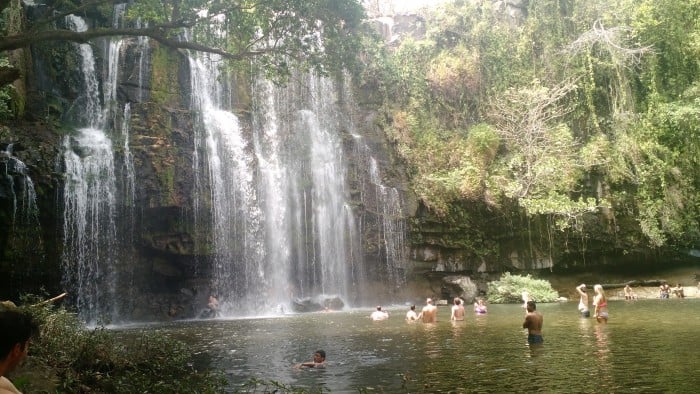On March 11, the Ministry of Environment and Energy in Costa Rica (MINAE) and the Ministry of Agriculture and Irrigation in Peru (MINAGRI) presented a program to exchange water harvesting technologies and water resource management. It has funding of up to 600 million colones from the European Union through the Forests, Biodiversity and Ecosystems EUROCLIMA+ program.
The objective is to transfer successful practices and experiences between both countries. Costa Rica will learn practices to sow and harvest water, while Peruvian regions of Piura and Ayacucho get learn about payments for eco-systemic services and water.
“This program was born as a means of adapting to climate change and will be implemented in the lower and middle basin of the Cañas River, in Guanacaste,” said Pamela Castillo Barahona, Viceminister of the Environment and Energy. “The initiative aims to recover water both for both human consumption and irrigation.”
In addition, indigenous and peasant farmers from both countries associated with the organizations Indigenous and Peasant Coordination Association of Central American Community Agroforestry (ACICAFOC-Costa Rica), Bartolomé Aripaylla Association (ABA-Perú) and Regional Water Fund (FORASAN-Perú) will participate.
According to the plan, the project will last two years and will work with funds amounting to 600 million colones.
“The alliance was born from the detection of points of expertise where the experience of each country can aid each other,” said Haydeé Rodriguez, Deputy Minister of Water and Seas. “Costa Rica, for its part, has the challenge of improving water supply in areas of tropical dry forest, in which Peru has experience, while Peru faces the need for protection, improvement and restoration of watersheds, through a system of payment for ecosystem services and water, which has already been successfully implemented in Costa Rica.”
A project based on cooperation
The proposal put forward by Peru and Costa Rica to EUROCLIMA+ aims to take advantage of each country’s experience in issues such as water sowing and harvesting, eco-systemic payment systems and the water management to work with the communities most vulnerable to climate change. They also want to promote actions that contribute to relief, adaptation and resilience.
“AIDER is a Peruvian NGO that harmonizes environmental conservation and sustainable development, managing innovative initiatives for the use of tropical forest resources,” said Jaime Nalvarte, Executive Director of AIDER. “Always with a focus on gender equality, interculturality, social inclusion and participation from the population living in and off the forest.”
Through this cooperation, it will be possible to improve the resilience of the populations of both countries to the effects of climate change. It will also contribute to Peru’s ability to develop financing instruments for the conservation and management of its water resources.
As for the enforcement of the project, which will last two years, the alliance proposes that operational teams be established in both countries. They’ll consist of engineers and technicians in sowing and harvesting water, ecosystem services, forests and climate change. The team will also have a social worker, who will facilitate the relationship with farmers and villagers involved in this action.
These teams will be in charge of conducting the activities in the field and will ensure the transfer of technology between both nations. There will also be a permanent technical exchange of professionals and farmers from both countries to ensure direct technical assistance.

The Tico Times is a member of Latin Clima, a collection of journalists and newsrooms working together to report on climate change throughout Latin America. This story was originally published by Latin Clima on March 27, 2019. Read the original Spanish version here.






